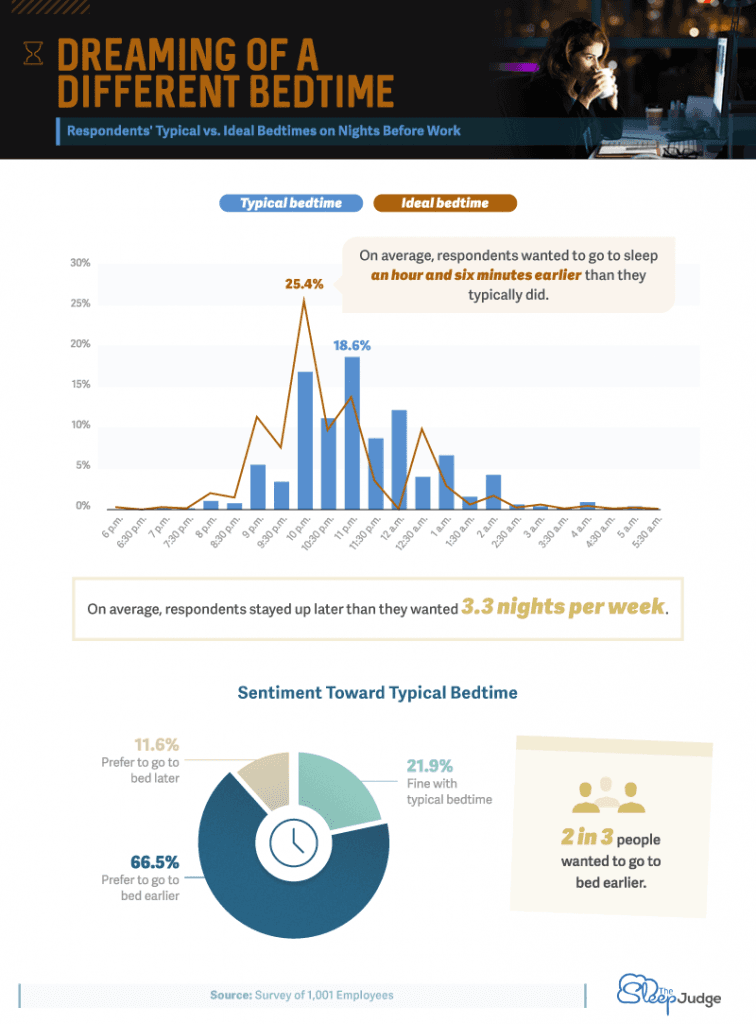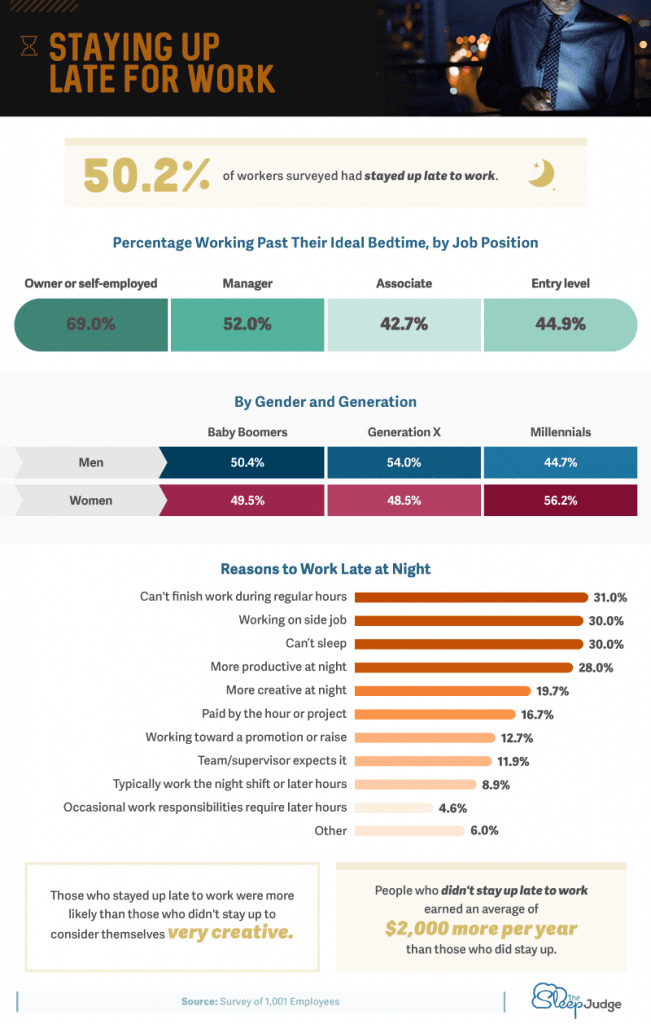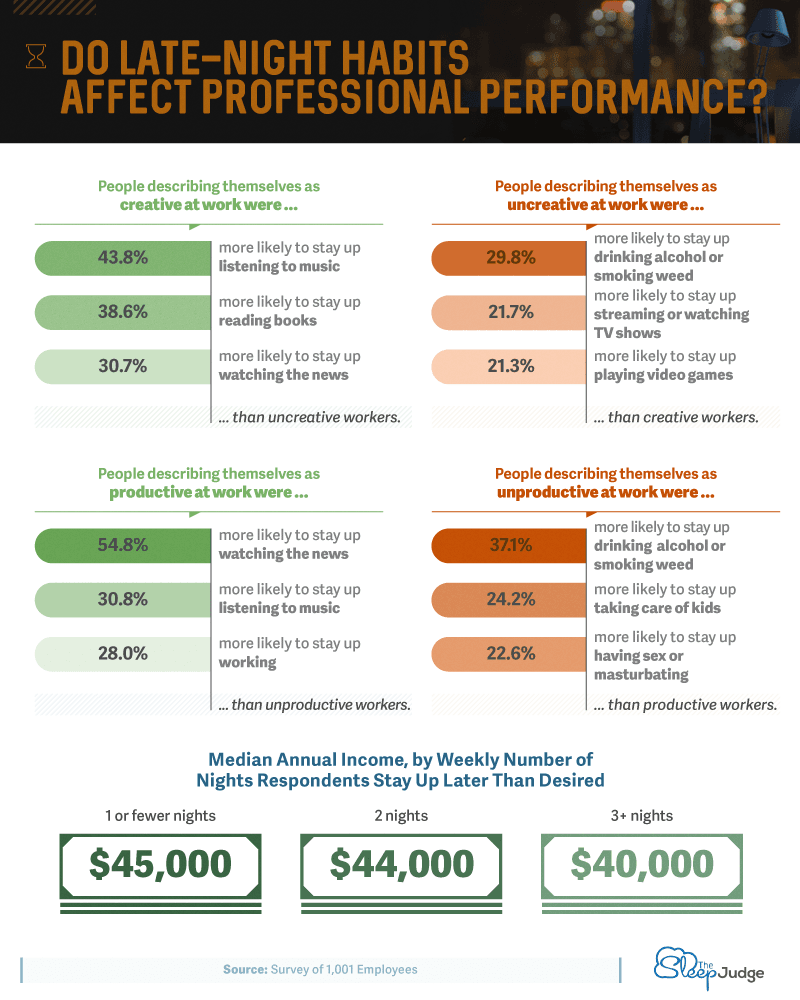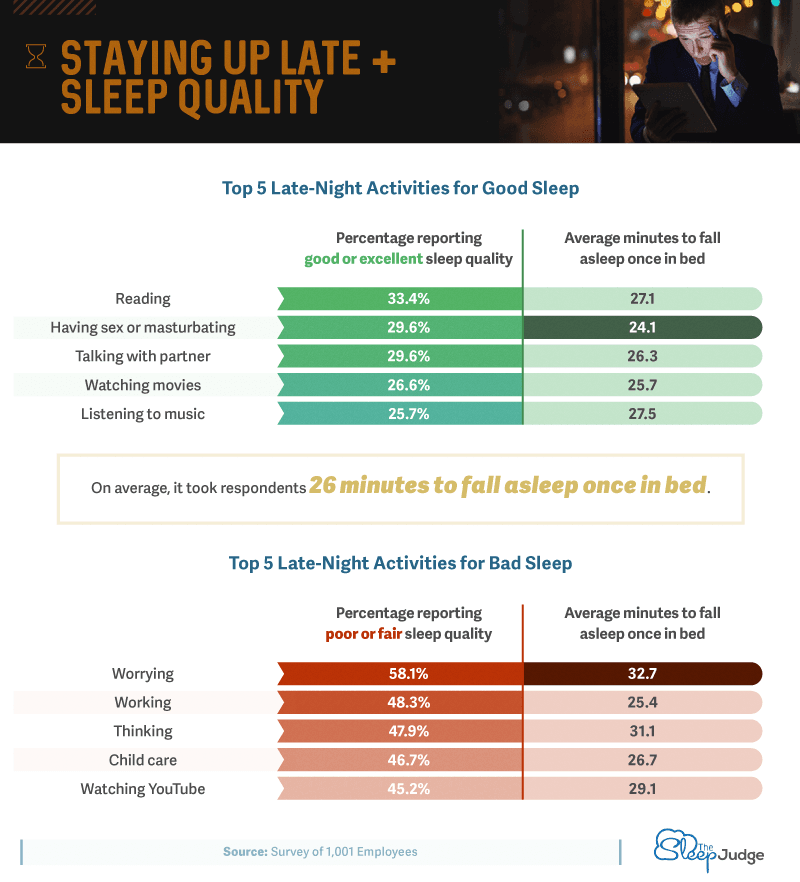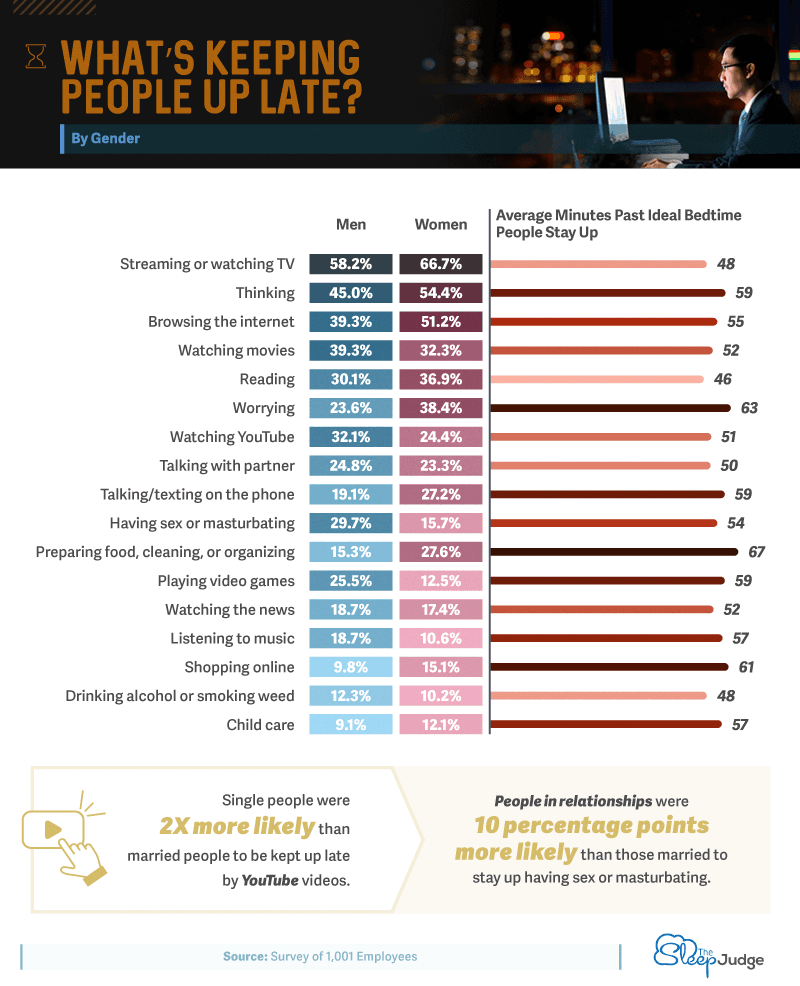The harmful side effects of sleep loss affect an alarming number of Americans today – and with some people kept up late due to work responsibilities or passion projects, the reasons many of us can’t sleep fall into a wide net. Counting sheep as they jump over an imaginary fence may help some drift off to sleep, but not everyone.
So we decided to survey 1,001 employed people about the activities keeping them up later than they’d like on work nights and how they’re affected the next day. Do people consistently stay up past their bedtime? Is there something respondents wish they could do to change their sleep habits? Find our full research findings below.
Yearning for More Zzz’s
Many of us want to get to sleep at a certain hour, but it doesn’t always end up that way: Only 1 in 5 respondents were happy with their current bedtime, while nearly 2 in 3 respondents wished for an earlier bedtime.
Over 25% of respondents wanted to be in bed by 10 p.m., but the average actual bedtime skewed later. The average survey participant went to bed around 11 p.m., but they preferred going to bed an hour and six minutes earlier. Chronologically, the last “spike” in average bedtimes came in the early morning hours, and it revealed that around 5% of respondents didn’t drift off until 12:30 a.m. on a normal night before work. In fact, people delayed sleep longer than they preferred an average of 3.3 days per week.
People frequently staying up late may suffer from insomnia, a condition that affects the brain and body, inhibiting someone from being able to “shut down” for the night. While some people display extreme symptoms that require medical intervention, many types of moderate or mild insomnia are short term and/or caused by temporary illness.
Bringing Work Home
When it comes to “burning the midnight oil,” around half of respondents stayed up late completing work tasks. And the top reason respondents worked into the night was that they felt they had too much work to complete during the day.
Owners and self-employed professionals might be more flexible when it comes to work hours because 69% of these individuals reported staying up later than intended due to work. However, 30% of people stayed up late to work on a side job or gig. Government estimates put the total number of Americans working more than one job at 13 million people, although even this figure might be deflated compared to reality.
Additionally, over 56% of millennial women admitted to staying up late to work, as opposed to 45% of men in their age group. Young women have struggled to build wealth for reasons out of their control and, as a result, are forced to work multiple jobs or work late to exceed expectations and compete with their male counterparts.
Which Late-Night Activities Are the Keys to Success?
Depending on how creative or productive someone sees themselves, they may be more prone to work into the night.
We found that respondents who claimed to be creative or productive were more likely to catch up on the news, listen to music, read, or even focus on work-related projects than those who described themselves as uncreative or unproductive.
On the other hand, people who considered themselves uncreative or unproductive indulged in leisurely, often sedentary pastimes, such as playing video games, watching TV, and drinking alcohol or consuming cannabis.
Regardless of the specific activity, though, sleep loss can affect income: In fact, staying up later than desired at least two nights a week resulted in a lower average salary than those only staying up, at most, one night a week.
Best and Worst Activities for Sleep
Our survey shows that immersing oneself in a good book is an effective way to get good or excellent sleep, with over 1 in 3 late-night readers reporting high-quality sleep.
Over 26% of survey participants also turned to a movie for assistance in finding good sleep – with less than 26 minutes enough time for the average person to drift off, indicating that an episode from a favorite show might be sufficient.
In terms of the worst activities for sleep quality, though, worrying and thinking ranked first and third, respectively, with around 48% of respondents each reporting poor or fair sleep quality. And those who were kept up later than preferred by worrying took more than a half-hour to fall asleep once in bed. Not only do some of these activities encourage poor sleep, but they may also contribute to poor health, such as gastrointestinal issues, mental illness, and neurological problems, among other things.
Men, Women Stay Up Late for Different Reasons
Overwhelmingly, worry was more likely to keep women up at night than men. Sleep anxiety (or in some cases, maintenance insomnia) is a very real disorder that manifests in times of great stress, revealing that women may hold a greater burden of stress on their shoulders.
Female respondents also were more likely to stay up late doing housework or making food: Nearly 28% of women were kept awake with chores or cooking, compared to only 15% of men.
But percentage breakdowns were nearly reversed when it came to those staying up to indulge in sex or some self-love. Additionally, our data revealed that people in relationships were 10 percentage points more likely than those who were married to stay up having sex or masturbating.
Some late-night activities also kept people up for over an hour later than they preferred, such as online shopping (61 minutes), worrying (63 minutes), and cleaning the house or prepping food (67 minutes).
Therefore, cutting down on activities that take up the most time should be a priority for anyone struggling with a lack of sleep, especially the ones that contribute to poor mental or physical health. Sleep influences our health dramatically, so ensuring proper sleep is key to a better quality of life.
Tips for the Best Sleep Possible
While some perform exceptionally well when burning the midnight oil, others flounder, better suited to tackling their work during the day. So while one person may only need five hours of sleep to succeed, others might need more.
These facts aside, the amount of time we spend on our careers and passions can absorb much-needed sleep, as indicated by the results of this survey. So follow our tips for unlocking the best sleep of your life:
- Establish a fair work-life balance. If your workload is overwhelming, try to restructure your schedule during office hours. It may even be worth informing a supervisor who is best equipped to address these issues and enact meaningful changes.
- Find the best way to wind down. Whether that means getting lost in a good book for half an hour or getting intimate with your partner, uncover the activities that help you the most.
- Consider a sleep-tracking app to discover insights into your sleep cycle and help you develop a targeted strategy to improve your numbers.
- Invest in a good mattress.
At The Sleep Judge, we are poised to offer authoritative advice and comparisons for mattresses, pillows, bed accessories, and more. Head over to our website to put together your ideal bed set and take your slumber to new heights.
Methodology
We surveyed 1,001 people who were employed either on a full-time or part-time basis for this study. Those who were not currently employed and those who failed an attention-check question were disqualified from participation. Additionally, we only surveyed people who were millennials, from Generation X, and baby boomers. Therefore, participants ranged in age from 21 to 73 with an average of 43.5 and a standard deviation of 12.6.
When asked to identify their work role, 426 respondents said they were associates, 254 were managers, 184 were owners or self-employed, and 137 were entry-level workers.
We asked people to identify the activities that kept them up at night past their ideal bedtime. Only activities with greater than 100 total respondents were included in the visualizations.
Additionally, we calculated the difference between participants’ reported typical bedtimes and ideal bedtimes by subtracting one number from the other. Outliers in numerical data (minutes, hours, and income) were excluded from the analysis.
Limitations
All of the findings presented here are based on self-reported information, so they could be influenced by minimization and telescoping, among other issues. This study was not conclusive of all the activities that people may do. Data were not weighted, nor were they statistically tested.
Fair Use Statement
Which of these sleep activities have you explored? Share your best tips for good sleep with your friends and include this data while you’re at it. But please only share these findings for noncommercial purposes and cite us when doing so.

